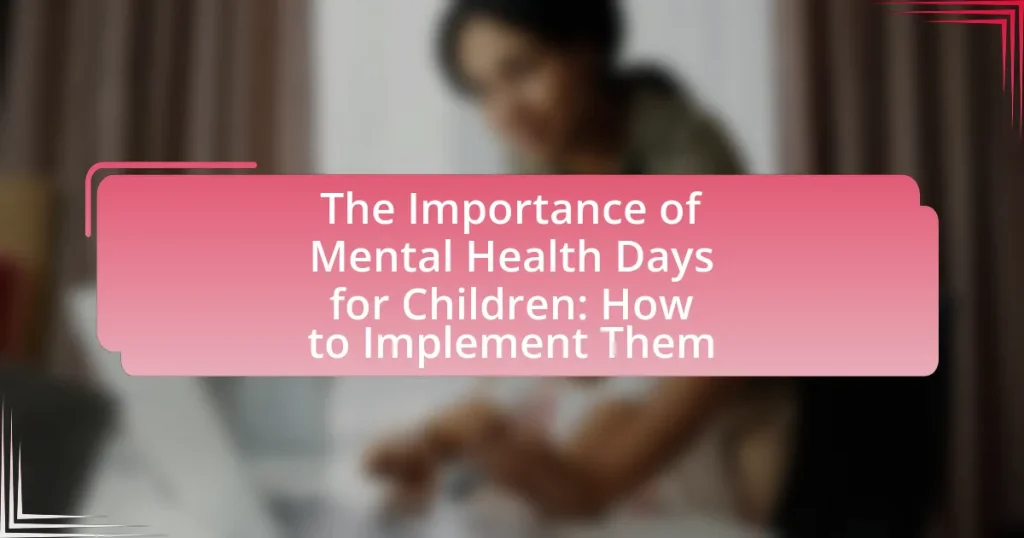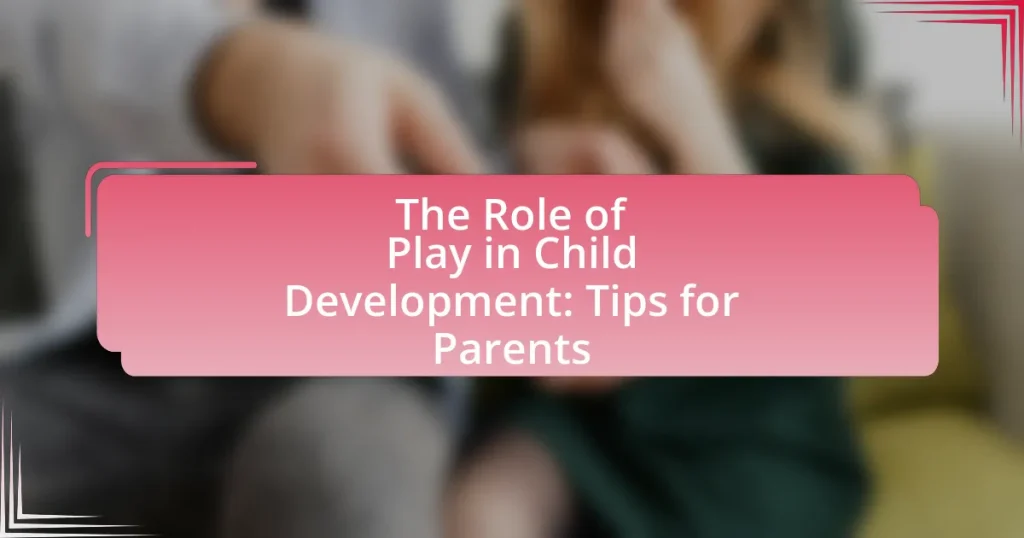Mental health days for children are designated breaks from school or regular activities aimed at promoting emotional and psychological well-being. These days are crucial for managing stress and anxiety, leading to improved emotional regulation and resilience. The article outlines the importance of mental health days, their impact on academic performance, and how they differ from regular sick days. It also discusses signs that indicate a child may need a mental health day, strategies for parents to implement these days effectively, and the long-term benefits of fostering mental health awareness in children. Additionally, it addresses potential challenges and misconceptions surrounding mental health days, emphasizing the need for supportive environments both at home and in schools.
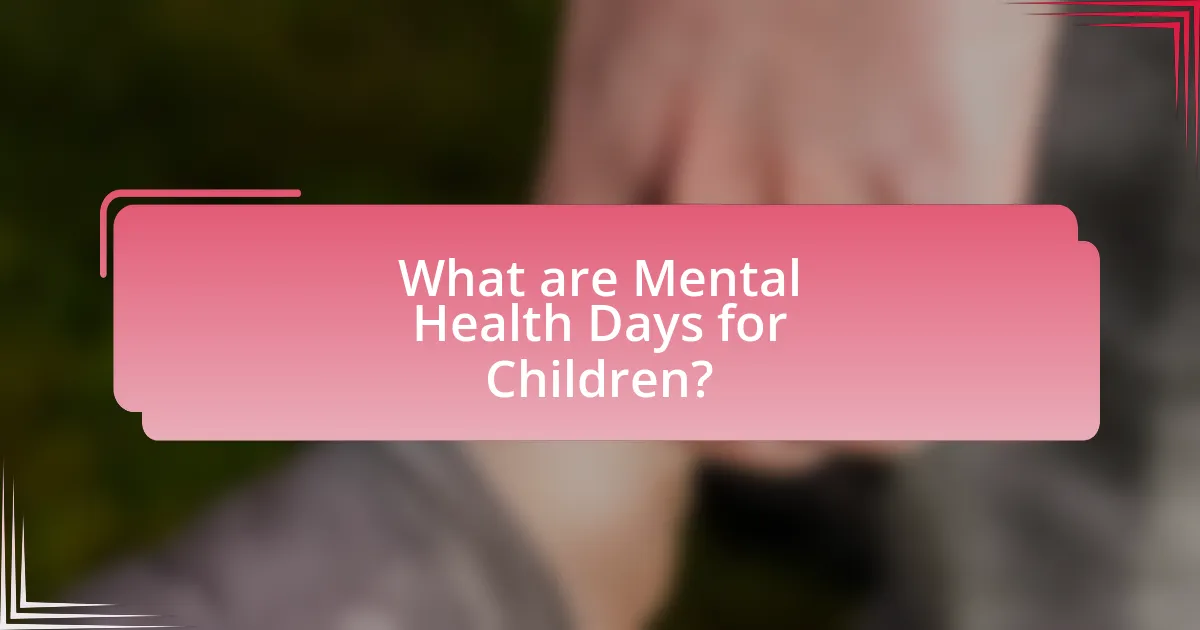
What are Mental Health Days for Children?
Mental health days for children are designated days off from school or regular activities that allow children to focus on their emotional and psychological well-being. These days are essential for helping children manage stress, anxiety, and other mental health challenges, promoting overall mental wellness. Research indicates that taking mental health days can lead to improved emotional regulation and resilience, as children learn to prioritize their mental health just as they would their physical health.
Why are Mental Health Days important for children’s well-being?
Mental health days are important for children’s well-being because they provide essential time for rest and recovery from stressors, promoting emotional resilience. Research indicates that children who take mental health days experience reduced anxiety and improved mood, which can lead to better academic performance and social interactions. A study published in the Journal of School Psychology found that students who had the opportunity to take breaks for mental health reported higher levels of well-being and lower levels of stress-related symptoms. This evidence underscores the significance of allowing children to prioritize their mental health, ultimately fostering a healthier developmental environment.
How do Mental Health Days contribute to emotional resilience?
Mental health days contribute to emotional resilience by allowing individuals to take necessary breaks for self-care, which helps in managing stress and preventing burnout. These days provide an opportunity for children to engage in activities that promote relaxation and emotional regulation, such as mindfulness practices or hobbies. Research indicates that regular breaks can enhance coping strategies and improve overall mental well-being, as evidenced by a study published in the Journal of Child Psychology and Psychiatry, which found that children who took mental health days reported lower levels of anxiety and improved emotional stability.
What impact do Mental Health Days have on academic performance?
Mental health days positively impact academic performance by allowing students to recharge and address their mental well-being. Research indicates that when students take time off to focus on their mental health, they often return to school more focused and engaged, leading to improved grades and overall academic success. A study published in the Journal of School Psychology found that students who took mental health days reported higher levels of motivation and better academic outcomes compared to those who did not. This evidence supports the notion that prioritizing mental health can enhance students’ ability to perform academically.
How do Mental Health Days differ from regular sick days?
Mental health days differ from regular sick days in that they specifically address emotional and psychological well-being rather than physical illness. While regular sick days are typically taken when an individual is physically unwell, mental health days are intended to provide individuals with the opportunity to recharge, manage stress, and address mental health needs. Research indicates that mental health issues can significantly impact overall health and productivity, with studies showing that mental health conditions can lead to increased absenteeism and decreased job performance. Therefore, recognizing the distinction between these types of days is crucial for fostering a supportive environment that prioritizes both physical and mental health.
What are the key distinctions between mental and physical health days?
Mental health days focus on emotional and psychological well-being, while physical health days address bodily health and recovery from illness or injury. Mental health days are intended to alleviate stress, anxiety, or burnout, allowing individuals to engage in activities that promote mental wellness, such as relaxation or therapy. In contrast, physical health days are typically taken to recover from physical ailments, such as flu or injury, and often involve rest and medical treatment. The distinction is crucial as it highlights the different needs and approaches required for mental versus physical health, emphasizing the importance of recognizing and addressing both aspects for overall well-being.
Why is it essential to recognize mental health as a valid reason for absence?
Recognizing mental health as a valid reason for absence is essential because it acknowledges the significant impact mental well-being has on a child’s ability to function effectively in educational settings. Research indicates that mental health issues, such as anxiety and depression, can severely hinder academic performance and social interactions, leading to long-term consequences if not addressed. For instance, the National Institute of Mental Health reports that approximately 1 in 5 children experience a mental health disorder, highlighting the necessity for schools to support mental health days as legitimate absences. By validating mental health as a reason for absence, educational institutions promote a healthier environment that prioritizes overall well-being, ultimately fostering better learning outcomes and emotional resilience among students.
What signs indicate a child may need a Mental Health Day?
Signs that indicate a child may need a Mental Health Day include persistent sadness, increased irritability, withdrawal from social activities, and difficulty concentrating. These behaviors often signal emotional distress or burnout, which can negatively impact a child’s overall well-being. Research shows that children experiencing high levels of stress may exhibit physical symptoms such as headaches or stomachaches, further indicating the need for a break. Recognizing these signs is crucial for parents and caregivers to support a child’s mental health effectively.
How can parents identify stress or burnout in their children?
Parents can identify stress or burnout in their children by observing changes in behavior, mood, and physical health. Common indicators include increased irritability, withdrawal from activities they once enjoyed, difficulty concentrating, changes in sleep patterns, and physical symptoms like headaches or stomachaches. Research indicates that children experiencing stress may also exhibit a decline in academic performance and social interactions, which can further signal underlying issues. Recognizing these signs early allows parents to address their child’s mental health needs effectively.
What behavioral changes should parents look for?
Parents should look for increased withdrawal from social interactions as a key behavioral change in their children. This may manifest as a reluctance to engage with friends or family, preferring solitude instead. Additionally, parents should be attentive to changes in mood, such as heightened irritability or sadness, which can indicate underlying stress or anxiety. Changes in sleep patterns, including insomnia or excessive sleeping, are also significant indicators of mental health issues. Furthermore, a decline in academic performance or loss of interest in previously enjoyed activities can signal that a child is struggling emotionally. Research shows that these behavioral changes often correlate with mental health challenges, emphasizing the need for parents to monitor and address these signs promptly.
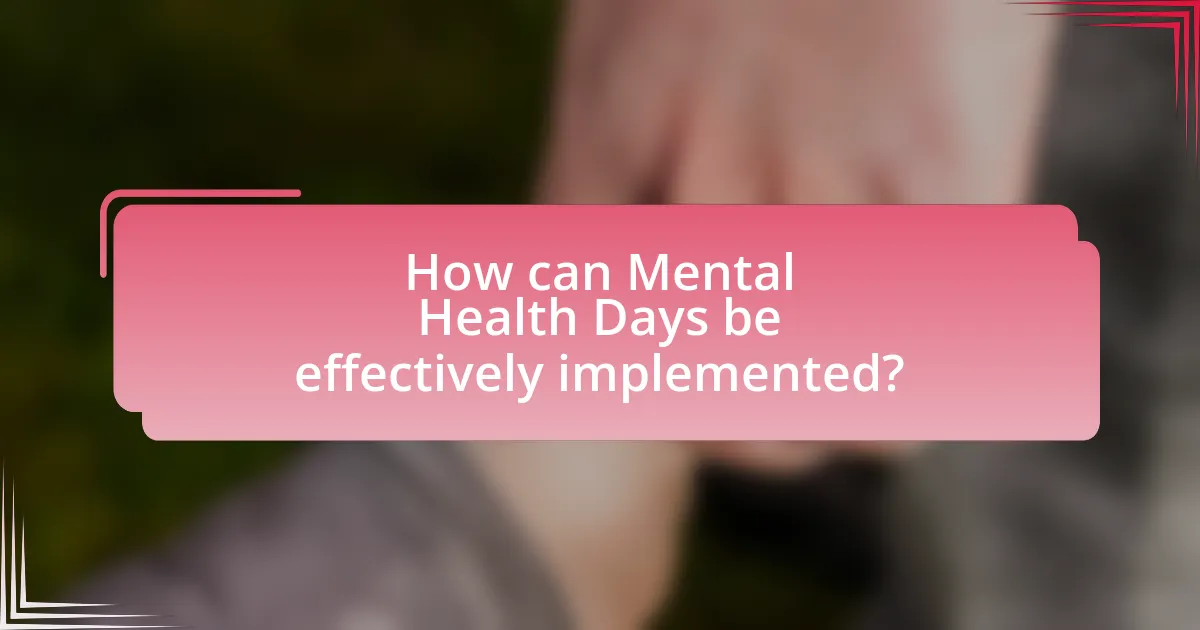
How can Mental Health Days be effectively implemented?
Mental Health Days can be effectively implemented by establishing clear policies that allow children to take time off from school without penalty for mental health reasons. Schools should create a supportive environment where students feel safe to express their mental health needs, ensuring that parents and educators are informed about the importance of mental well-being. Research indicates that when schools adopt flexible attendance policies and provide resources for mental health support, students demonstrate improved academic performance and emotional resilience. For instance, a study published in the Journal of School Health found that schools with mental health days reported a 20% decrease in student anxiety levels, highlighting the positive impact of such initiatives.
What strategies can parents use to introduce Mental Health Days?
Parents can introduce Mental Health Days by openly discussing the importance of mental well-being and normalizing the concept of taking breaks for mental health. This can be achieved through family conversations that emphasize emotional health as equally important as physical health, thereby creating an environment where children feel safe to express their feelings. Research indicates that children who understand and can articulate their emotions are better equipped to manage stress and anxiety, which supports the rationale for Mental Health Days. Additionally, parents can model self-care behaviors by taking their own mental health days, demonstrating that prioritizing mental health is a valuable practice.
How can parents communicate the importance of Mental Health Days to their children?
Parents can communicate the importance of Mental Health Days to their children by openly discussing mental health and its significance in overall well-being. Engaging in conversations about feelings and stress can help children understand that taking a break for mental health is as vital as physical health. Research indicates that children who are taught about emotional well-being are more likely to recognize their own mental health needs, leading to healthier coping strategies. By modeling self-care behaviors and sharing personal experiences, parents can reinforce the message that prioritizing mental health is essential for a balanced life.
What role does school play in supporting Mental Health Days?
Schools play a crucial role in supporting Mental Health Days by providing a structured environment that acknowledges and prioritizes students’ mental well-being. By implementing policies that allow students to take Mental Health Days, schools validate the importance of mental health alongside physical health, fostering a culture of openness and support. Research indicates that when schools promote mental health awareness and provide resources, such as counseling services and educational programs, students are more likely to utilize Mental Health Days effectively, leading to improved academic performance and emotional resilience.
How can parents create a supportive environment for Mental Health Days?
Parents can create a supportive environment for Mental Health Days by openly communicating with their children about mental health and validating their feelings. This approach fosters trust and encourages children to express their emotional needs without fear of judgment. Research indicates that children who feel supported by their parents are more likely to engage in healthy coping strategies during stressful times, as highlighted in a study published in the Journal of Child Psychology and Psychiatry, which emphasizes the role of parental support in children’s emotional well-being. Additionally, establishing routines that prioritize relaxation and self-care can further enhance this supportive environment, allowing children to recharge effectively.
What activities can children engage in during a Mental Health Day?
Children can engage in various activities during a Mental Health Day, including mindfulness exercises, creative arts, outdoor play, and relaxation techniques. Mindfulness exercises, such as deep breathing or guided meditation, help children manage stress and improve emotional regulation. Creative arts, like drawing or crafting, allow for self-expression and can enhance mood. Outdoor play, such as hiking or playing in a park, promotes physical activity and connection with nature, which are beneficial for mental well-being. Relaxation techniques, including yoga or reading, provide opportunities for rest and rejuvenation. These activities are supported by research indicating that engaging in creative and physical activities can significantly improve children’s mental health and emotional resilience.
How can parents ensure their child feels safe and understood during this time?
Parents can ensure their child feels safe and understood during this time by actively listening to their child’s feelings and validating their emotions. Research indicates that children who feel heard are more likely to express their thoughts and concerns, which fosters a sense of security. Engaging in open conversations about their experiences and emotions allows parents to create a supportive environment. Additionally, providing consistent routines and reassurance can help children feel more stable, as predictability is crucial for emotional well-being. Studies show that children thrive in environments where they feel emotionally supported, leading to improved mental health outcomes.
What challenges might arise when implementing Mental Health Days?
Implementing Mental Health Days may face challenges such as stigma, lack of understanding, and potential misuse. Stigma surrounding mental health can deter individuals from taking these days, as they may fear judgment from peers or authority figures. Additionally, a lack of understanding among educators and parents about the importance of mental health can lead to resistance in allowing children to take these days. Furthermore, there is a risk of misuse, where students might take Mental Health Days for non-mental health-related reasons, complicating the implementation process. These challenges highlight the need for clear communication and education on the significance of mental health in children.
How can parents address potential stigma associated with taking Mental Health Days?
Parents can address potential stigma associated with taking Mental Health Days by openly discussing mental health with their children and normalizing the concept of taking time off for mental well-being. By fostering an environment where mental health is treated with the same importance as physical health, parents can help reduce feelings of shame or embarrassment. Research indicates that 1 in 5 children experience mental health issues, highlighting the necessity of prioritizing mental health care. Additionally, parents can share their own experiences or stories of others who have benefited from taking Mental Health Days, reinforcing that it is a valid and healthy choice.
What are common misconceptions about Mental Health Days?
Common misconceptions about Mental Health Days include the belief that they are an excuse for laziness or avoidance of responsibilities. This perception undermines the legitimate need for mental health care, as studies show that taking time off for mental well-being can enhance productivity and overall health. Research from the American Psychological Association indicates that mental health days can reduce burnout and improve focus, demonstrating their importance in maintaining mental wellness.
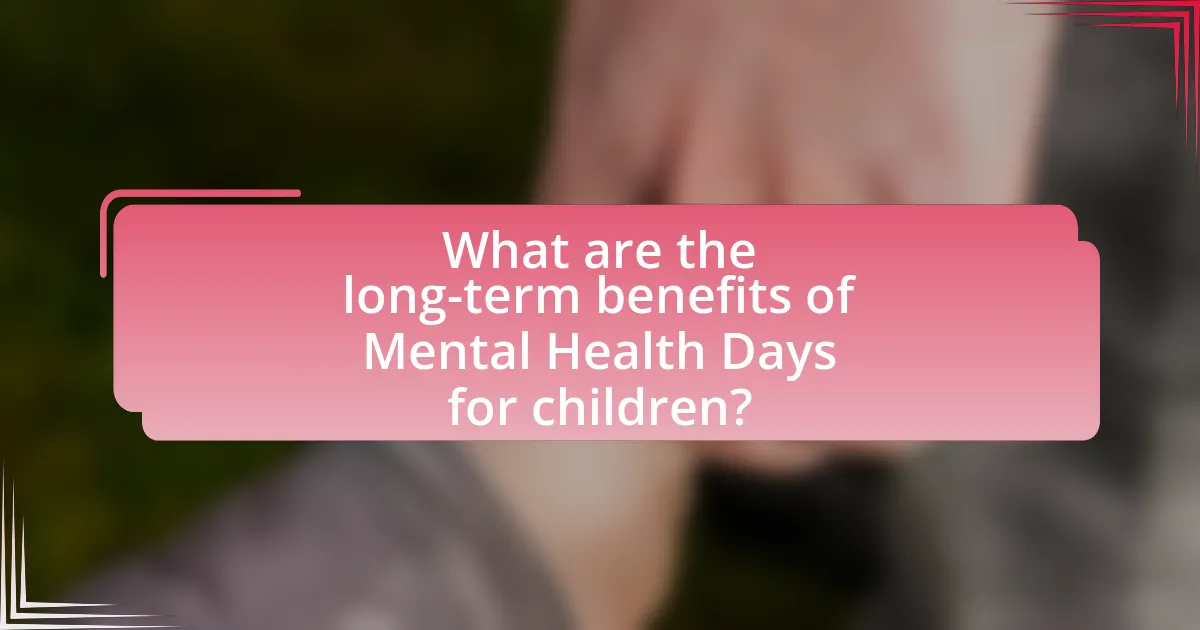
What are the long-term benefits of Mental Health Days for children?
Mental health days for children provide long-term benefits such as improved emotional resilience, better academic performance, and enhanced social skills. By allowing children to take breaks when feeling overwhelmed, they learn to manage stress effectively, which contributes to their emotional resilience over time. Research indicates that children who take mental health days show a decrease in anxiety and depression symptoms, leading to better focus and engagement in school activities. Furthermore, these days promote the development of social skills, as children learn to communicate their needs and feelings, fostering healthier relationships with peers and adults. Studies have shown that children who practice self-care through mental health days are more likely to develop positive coping strategies, which can lead to lifelong mental well-being.
How do Mental Health Days contribute to lifelong mental health awareness?
Mental Health Days contribute to lifelong mental health awareness by promoting the understanding and importance of mental well-being from an early age. These designated days allow individuals, particularly children, to recognize the significance of taking breaks for mental health, fostering a culture that values emotional wellness. Research indicates that early exposure to mental health concepts can lead to better coping strategies and reduced stigma surrounding mental health issues later in life. For instance, a study published in the Journal of School Psychology found that students who participated in mental health awareness programs showed increased knowledge and positive attitudes towards mental health, which supports the idea that Mental Health Days can instill lifelong awareness and proactive mental health practices.
What skills do children develop through regular Mental Health Days?
Children develop emotional regulation, stress management, and self-awareness skills through regular Mental Health Days. These days allow children to take a break from academic pressures, which helps them learn to identify and manage their emotions effectively. Research indicates that taking time off for mental health can lead to improved coping strategies, as children engage in activities that promote relaxation and mindfulness. For instance, a study published in the Journal of Child Psychology and Psychiatry found that children who practiced mindfulness techniques showed significant improvements in emotional regulation and reduced anxiety levels. Thus, regular Mental Health Days contribute to essential life skills that enhance children’s overall well-being.
How can Mental Health Days influence future coping strategies?
Mental health days can significantly enhance future coping strategies by providing individuals with the necessary time to recharge and reflect on their emotional well-being. This intentional break allows children to develop self-awareness regarding their mental health needs, which is crucial for recognizing stressors in the future. Research indicates that taking mental health days can lead to improved emotional regulation and resilience, as children learn to identify when they need a break and how to manage their feelings effectively. For instance, a study published in the Journal of School Psychology found that students who took mental health days reported lower levels of anxiety and better coping mechanisms in stressful situations. This evidence supports the notion that mental health days not only serve immediate relief but also equip children with lifelong skills to handle future challenges.
What best practices should parents follow when implementing Mental Health Days?
Parents should prioritize open communication and establish clear guidelines when implementing Mental Health Days. Open dialogue allows children to express their feelings and understand the importance of mental health, fostering a supportive environment. Establishing guidelines, such as frequency and duration of these days, helps children learn to balance self-care with responsibilities. Research indicates that regular mental health breaks can improve emotional well-being and academic performance, highlighting the effectiveness of structured Mental Health Days.
How can parents balance Mental Health Days with academic responsibilities?
Parents can balance Mental Health Days with academic responsibilities by proactively planning and communicating with educators. Establishing a clear schedule that includes designated Mental Health Days allows parents to ensure that their children can take necessary breaks without falling behind in their studies. Research indicates that mental health breaks can enhance overall academic performance, as students return to their studies more focused and engaged. For instance, a study published in the Journal of Educational Psychology found that students who took regular breaks for mental health reported higher levels of motivation and better academic outcomes. By coordinating with teachers to manage assignments and deadlines, parents can create a supportive environment that prioritizes mental well-being while maintaining academic progress.
What resources are available to support parents in this process?
Resources available to support parents in implementing mental health days for children include educational websites, community programs, and mental health professionals. Websites such as the National Alliance on Mental Illness (NAMI) provide information on mental health awareness and strategies for parents. Community programs often offer workshops and support groups that focus on mental health education and coping strategies. Additionally, consulting with mental health professionals, such as child psychologists or counselors, can provide tailored guidance and resources specific to a child’s needs. These resources collectively empower parents to effectively support their children’s mental health.










